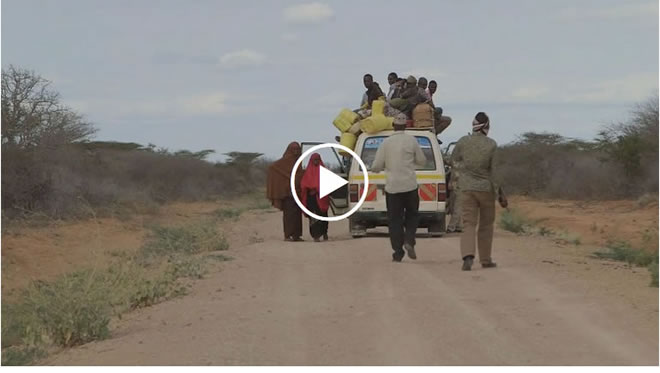

Sunday, July 26, 2015
Garissa, Kenya (CNN)Dirt tracks criss-cross the bush, leading through the dusty, rust-colored soil and scrub-dotted no-man's land of northern Kenya and across the border into Somalia.
They're known as "Panya," or "Rat Routes," and they are the paths used by smugglers -- and, we've been told, by Al-Shabaab militants.
This is the "back door" to Kenya. Away from the official border crossings, here there are no government officials, no checkpoints, no patrols, no security searches: you can bring whoever and whatever you want in and out.
One man who spoke to CNN told us he uses the back-roads regularly, ferrying people back and forth to the Southern Somali port town of Kismayo: No passports, no questions.
That's despite the fact that some of the tracks run just 20 kilometers from a major military base and the Dadaab airstrip.
In the aftermath of the Al-Shabaab attack on the Westgate Mall in September 2013, the Kenyan government said the militants involved had crossed through from Somalia using the Panya.
Two years on, though, the routes are even busier than before, in spite of an increased security drive by the government.
"We are not denying that there are problems and there are smugglers in those areas," says Mwenda Njoka, spokesman for the Ministry of the Interior, who notes that ensuring proper controls along the entire length of the 800km border is a "serious challenge."
The government says it plans to build a wall along the border, put up security cameras, and expand its new border patrol units -- but that it is an international problem, and needs international support.
"There is a boundary that is being constructed around the Kenya Somali border," says Njoka. "It has been porous for a long time because the previous government have not taken serious action. [But] in the recent past we have established a border patrol police, a specialist police."
But Al-Shabaab's attacks and ambitions have been spilling over into Kenya with deadly frequency.
In April, members of the Somali militant group stormed Garissa University, killing 147 people in a dawn raid on an early morning prayer service and student hostels.
Iqra Abdi Haji was one of the students caught up in the bloodshed. The 21-year-old was in her first year of an economics degree when gunmen stormed her dormitory.
"My first thought was that I'll die, I'll not escape from this place," Abdi Haji says. She was shot in the shoulder, and her friend was badly injured. "I was bleeding from this side, and also bleeding from my leg -- I couldn't move at all." She and her friend are now studying at a different university.
Six days after the Garissa massacre, Abdelrashid Bare's older brother Hamza Mohammed disappeared.
Security camera footage from a telecoms shop in the center of the town appears to show Hamza Mohammed, 26, sitting behind a cash register when four men walk in.
As Hamza Mohammed hands a phone to one of the men, the man grabs him, jumping over the counter to handcuff his arms behind his back. A camera trained on the front of the shop shows him being led away, cuffed, in broad daylight.
The date stamp on the surveillance footage -- provided by the family -- reads April 8. Bare says it the last time anyone in the family saw his brother. He believes Hamza Mohammed was taken away by the Kenyan Anti-Terrorism Police Unit (ATPU), suspected of being a terrorist -- a charge authorities deny.
As the Kenyan government steps up its campaign against the insecurity plaguing the country, human rights groups say young Kenyan men and women have been disappearing. No one knows where they've gone.
"We've gotten a lot of those types of comments from the media, but when we go out and look for them, we don't find," says Ministry of the Interior spokesman Njoka. "Sometimes we don't know if these are allegations just to create sympathy.
"If there are cases of people who have disappeared and the believed they could be held by ATPU, let them report to the police, the interior ministry."
Njoka says his government is bound by laws which require suspects to be brought to court within 24 hours. If they're not charged he says, they must be released. The Kenyan government, he insists, does not hold suspects without charge.
But Hamza Mohammed Bare is still missing, and in Kenya's fight against terrorism, stories like his are being told across the country.
His brother says people feel they can't win, that they are caught between their government and the threat of Al-Shabaab.
Al-Shabaab, though, is no longer the only danger: Growing numbers of Kenyans are believed to be joining ISIS, prompting a crackdown by Kenya's security services.
Some of those who disappear do eventually get in touch, telling their families that they have answered what they say is a higher call: to fight for ISIS in Syria.
The government has appealed to parents -- especially those in slum areas, whose inhabitants are considered more vulnerable to radicalization, "to be aware of what their children are doing" and "what company they are keeping," says Njoka.
One father, who was too scared to speak to CNN on camera, told us that his nephew traveled to Khartoum in Sudan and then on to an ISIS camp. Once there, he sent money and detailed instructions so that the man's son could follow him.
As yet there are no exact details on the numbers of Kenyans joining ISIS -- but it's clearly another reason for the government to worry.